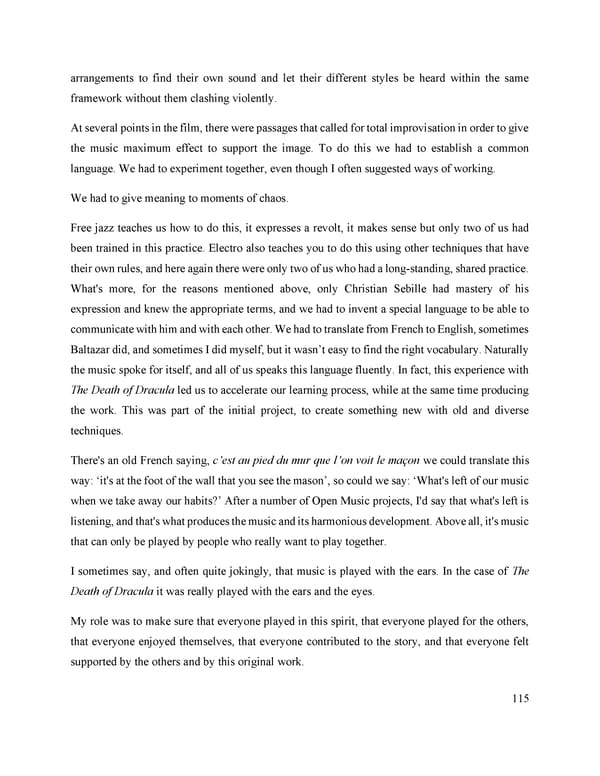arrangements to find their own sound and let their different styles be heard within the same framework without them clashing violently. At several points in the film, there were passages that called for total improvisation in order to give the music maximum effect to support the image. To do this we had to establish a common language. We had to experiment together, even though I often suggested ways of working. We had to give meaning to moments of chaos. Free jazz teaches us how to do this, it expresses a revolt, it makes sense but only two of us had been trained in this practice. Electro also teaches you to do this using other techniques that have their own rules, and here again there were only two of us who had a long-standing, shared practice. What's more, for the reasons mentioned above, only Christian Sebille had mastery of his expression and knew the appropriate terms, and we had to invent a special language to be able to communicate with him and with each other. We had to translate from French to English, sometimes Baltazar did, and sometimes I did myself, but it wasn’t easy to find the right vocabulary. Naturally the music spoke for itself, and all of us speaks this language fluently. In fact, this experience with The Death of Dracula led us to accelerate our learning process, while at the same time producing the work. This was part of the initial project, to create something new with old and diverse techniques. There's an old French saying, c’est au pied du mur que l’on voit le maçon we could translate this way: ‘it's at the foot of the wall that you see the mason’, so could we say: ‘ What's left of our music when we take away our habits?’ After a number of Open Music projects, I'd say that what's left is listening, and that's what produces the music and its harmonious development. Above all, it's music that can only be played by people who really want to play together. I sometimes say, and often quite jokingly, that music is played with the ears. In the case of The Death of Dracula it was really played with the ears and the eyes. My role was to make sure that everyone played in this spirit, that everyone played for the others, that everyone enjoyed themselves, that everyone contributed to the story, and that everyone felt supported by the others and by this original work. 115
 Lost Analogue: Exploring Film, Music, and Interdisciplinary Methods in Education Page 115 Page 117
Lost Analogue: Exploring Film, Music, and Interdisciplinary Methods in Education Page 115 Page 117